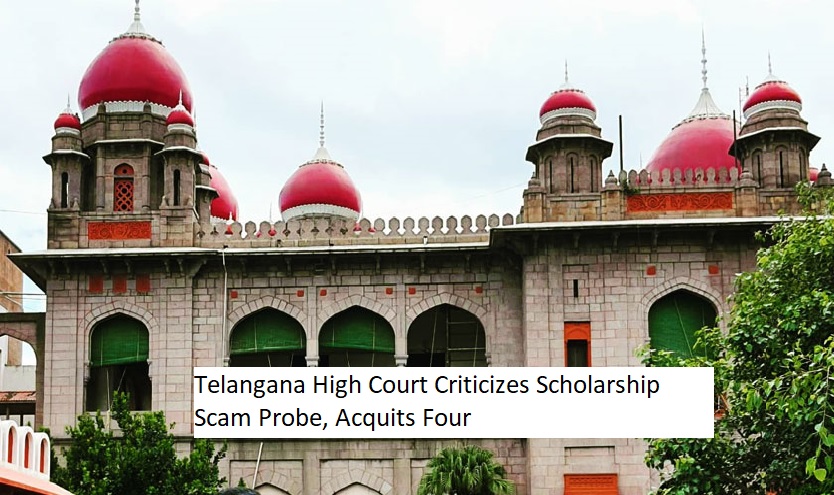


The Telangana High Court has recently made a significant decision, setting aside a conviction order related to an alleged pre-matric scholarship scam. The court took issue with the "circumstantial" nature of the conviction order issued by the Trial Court and criticized the disregard for the basics of admissibility in criminal trials.
The accused individuals, in this case, were District Tribal Welfare Officers alleged to have orchestrated a pre-matric scholarship scam. The accusations included the creation of eight bogus schools, the forging and fabrication of pre-matric scholarship bills in the names of these fictitious schools, and the embezzlement of approximately Rs. 3.78 crores. The alleged fraudulent activities involved collecting government checks from the Deputy Pay Accounts Office.
Justice K. Surender, who presided over the case, expressed dissatisfaction with the Trial Court's handling of the matter. According to the Justice, a careful examination of the evidence and findings revealed a blatant disregard for the basics of admissibility in criminal trials. The court raised concerns about the reliance on inadmissible evidence leading to conclusions in the judgment.
The accused individuals had appealed the conviction, and the High Court's decision came in response to this appeal. The court noted that the investigation originated from a report filed by the Inspector of Police special, WCO, Central Crime Station, Hyderabad. However, it pointed out that the Trial Court heavily relied on the allegations presented by the Inspector of Police and the evidence provided by the Assistant Director in the office of Commissioner and Directorate of School Education.
The Inspector's report claimed that the accused had embezzled government funds allocated for pre-matric scholarships between 1992 and 2000, using the money to purchase several properties. Justice Surender highlighted the suspicious timing of the investigation, initiated by the DCP's directive in 2002, with a report filed by the inspector the very next day. The Inspector's failure to support allegations with documentary proof and the absence of cross-verification of government records raised questions about the integrity of the investigation.
The Court underscored the Inspector's lack of effort in backing his claims with concrete evidence, especially in relation to the existence of recognized schools and eligible students for scholarships. It was noted that the Inspector admitted the existence of a register showing eligible students but failed to reference it before filing the report, invoking negative inferences under Section 114-G of the Indian Evidence Act.
Section 114-G allows the court to presume that evidence not produced, which could be unfavorable to the withholding party, would be detrimental to their case. The Court, in the absence of substantial evidence apart from inadmissible contents, expressed doubt about the prosecution's claim regarding the non-existence of the eight schools.
Justice Surender also referred to a precedent, Kali Ram v. State of Himachal Pradesh, emphasizing that a letter given to a police official is not admissible, similar to a statement. The second piece of evidence relied upon by the prosecution was a letter from Dr. Man Mohan Singh, Commissioner and Director of School Education, addressed to the Assistant Commissioner. This letter purportedly confirmed the bogus nature of the schools. However, the Court dismissed this evidence, highlighting that a simple reading of the document revealed the existence of at least five out of the alleged eight schools.
The Court also delved into the procedural aspects of scholarship fund disbursement. It outlined the established procedure involving press releases, committee formation chaired by the District Collector, and the role of the DTWO in approving applications and verifying student admissions. The Court pointed out the lack of communication between the accused and the alleged issuance of cheques. It questioned the authenticity of the cheques, noting discrepancies in signatures and the absence of forensic evidence.
Furthermore, the Court criticized the investigative agency for failing to collect essential documents such as the Audit Treasury Manual, Budget Control Register, and Form 44 Register, which could have provided clarity on bill processing. The absence of official documents raised doubts about the validity of the prosecution's claims.
In its decision to quash the case against the accused, the Court highlighted the necessity for prior notice before arresting public servants, the lack of a proven nexus between the Tribal Workmen and the alleged scam, and the prosecution's failure to substantiate its case. The judgment underscores the importance of thorough investigations, adherence to legal procedures, and the presentation of admissible evidence in criminal trials.
TAGS: Telangana High Court Pre-matric scholarship scam Circumstantial conviction Trial Court . Admissibility in criminal trial Justice K. Surender